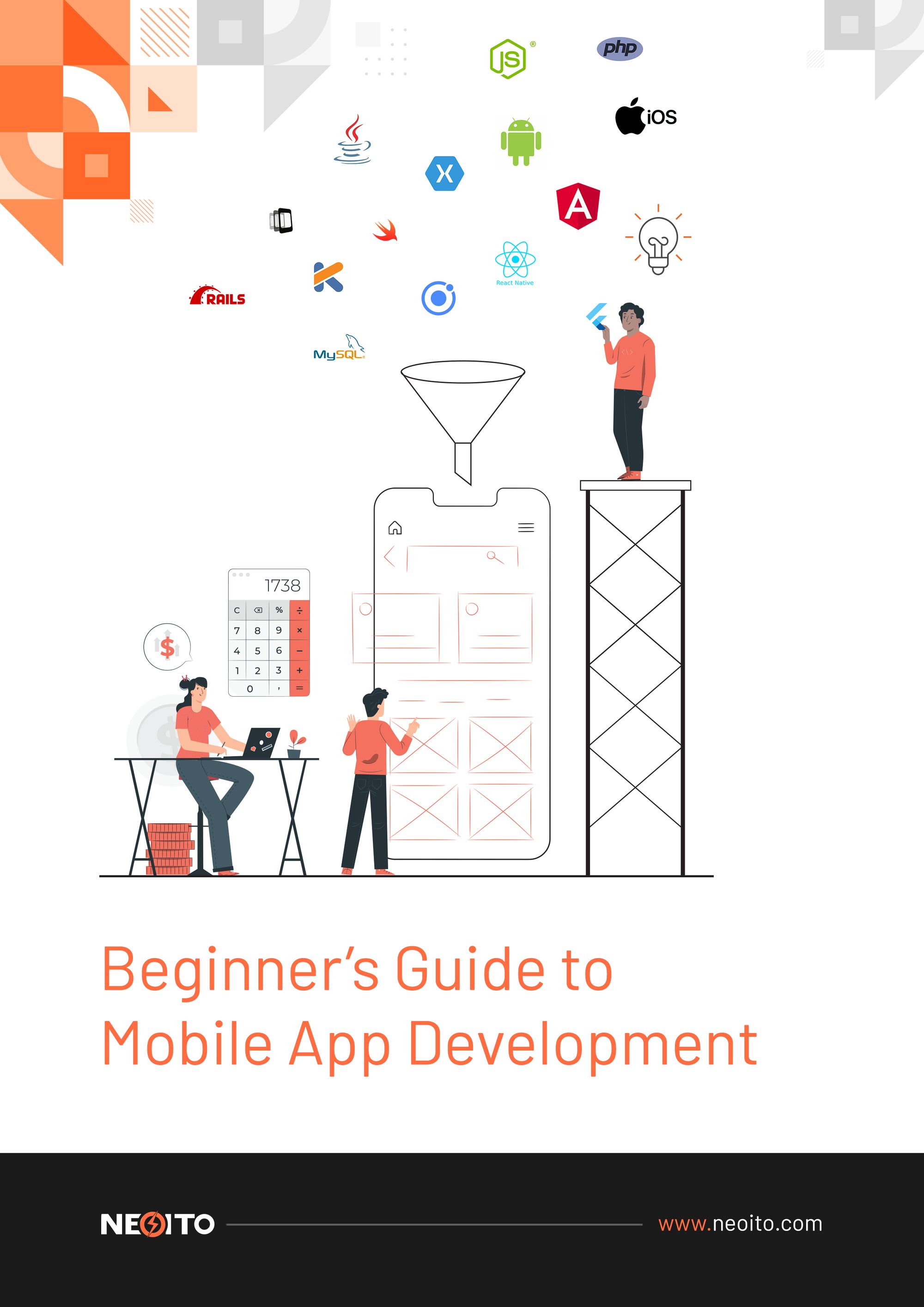Native and Hybrid are two of the most common approaches to mobile app development. What makes them different from one another? Which one is right for you? Let’s find out.

Free Download
A Complete Guide to Mobile App Development
Simple Scenario
Let’s consider a situation where you have a dry cleaning business. You realise it’s time to introduce a collection and delivery system based on your customer feedback. And you decide to build an app to streamline this process.
The app is aimed at providing customers the ability to track their dry cleaning and also pay online. You ask your friends what are the options present in front of you? Dumbstruck at all the different options like native apps, hybrid apps, etc., you are confused and don’t know which is the right option for you.
In this article, we intend to give you a clear picture for you to choose the right option for your app.
There are different types of mobile app technologies for you to choose from. The technology that your business needs depends on several factors including the type of business, your customer base and also the cost-effectiveness.
With that said, you can’t compromise on quality and efficiency. But randomly picking one just won’t cut it. So you try to figure out which is best for you.
You might be thinking:
Are all these apps developed the same way? Why are some apps available only for android and not for iOS and vice versa?
We have also seen apps that look and feel the same in all devices and some which are different. We will answer these questions here and introduce you to Native and hybrid apps.
The Initial Process
When you hire a mobile app development company, they analyse your business first. They take into account the size of your business, your target customers, whether you need to develop the app for multiple devices and so on.
They also consider your current financial situation and the time available to develop the app. After analysing all these data they will come to you with suggestions regarding the path you need to take for your app development. This is an important step before development because it prevents companies from investing too much money and resources into an app without getting the desired result.
Check out: A Beginner’s Guide to MVP Software Development: Benefits, Challenges, Examples, and more
What are Hybrid and Native Apps?
Simply put, native apps are software programs that are used only on a single platform like android or iOS. Whereas, Hybrid apps are programs that combine the elements of both native and web applications.
Native apps only work in a single platform like android or iOS. If you want a native app on multiple platforms then you have to build the app from the ground up for each platform. Hybrid apps work on multiple platforms since the framework in which they are built on converts the code into native form according to the platform required. This makes the app perform similar to a native app.
Native Apps
Native apps are programs designed and developed to run on a particular OS or platform. For instance, a native app built for android will not run on iOS, for that a separate app has to be built from the ground up. The distinctiveness of the platform for which the native apps were built offered the best results.
Native apps are coded in a specific language which targets a particular platform. For iOS, apps are built using Objective C, whereas android apps are primarily built using Java and Kotlin.
Native apps can take full advantage of the features and software tools installed on that particular platform. This results in better performance on mobile devices. While developing native apps, developers and designers should adhere to the strict guidelines of Android and iOS since these platforms have different behaviour (effects, gestures) and appearances (graphic styles, typography).
Advantages of Native Apps
Many people prefer to use Native app over hybrid for many reasons. You can find some of them below:
-
-
- Native app codes are faster than those of hybrid. This results in animations, graphics and HD games running faster and smoother on it.
- Native apps do not require the help of native plugins to access the device features.
- Native apps are built using the tools and standards created by the OS companies like Google and Apple. So new features introduced by them will be first made available to the native apps.
-
Limitations of Native App
Even though Native app is at the forefront when it comes to performance and reliability, it does have some limitations, some of which are below:
-
-
- Since Native apps are built only for a single OS. A separate development process is required to make apps for different platforms.
- Development time and costs of Native apps are high since each platform has its unique code.
- Updating the apps is a challenge since the same app has different codes on different platforms.
-
Hybrid Apps
Hybrid apps are similar to native apps in the sense that it can be downloaded from the platforms app store. Hybrid apps have the features of both native apps and web browsers. Hybrid apps can perform somewhat close to that of native apps. They are built primarily using HTML, JavaScript and CSS.
“React Native is currently the most popular hybrid framework available in the market. A lot of enterprise applications like Facebook, instagram. etc., have been built using it.” says Suralal S, Senior software developer at NeoITO.
Hybrid apps use the same engine web browsers run on called webView. This enables them to be made from a single code base and can run on multiple platforms. If Hybrid apps are well-designed, they are indistinguishable from Native apps. The need to learn separate languages is negated by the use of Hybrid apps.
Startups prefer hybrid apps since they provide the best value for money. You can reach a larger user base without having to go overboard with the development time and costs.
Do you know what is the current average app development cost?
Advantages of Hybrid Apps
Hybrid apps are popular among developers and organisations for many reasons. Let’s look at some of the reasons why it is preferred:
-
-
- Just a single code base is required for hybrid apps to work on all platforms. Only a single development process is required to enable the app to work on all platforms. This is the direct opposite of native apps which require development for each platform.
- Hybrid apps can provide the same user experience across all the platforms.
- Hybrid apps are faster and cheaper to build than native apps. Maintenance is also cheaper.
- Hybrid apps can run on web browsers since they are built using web technologies.
- A separate app development team is not required to build a hybrid app since it uses the same web technology.
-
Limitations of Hybrid Apps
As with Native apps, hybrid apps have shortcomings of their own. Some of them are listed below:
-
-
- In order to access all features of a native device, hybrid apps depend on native plugins.
- The performance of hybrid apps is low when dealing with HD games and graphically heavy apps.
-
“Even though its true, The modern frameworks available in the current market can provide truly native UI and performance for hybrid apps. In the long run, hybrid apps are going to rule the mobile app development space.” Suralal commented.
Take a look at the 21 most commonly asked mobile app development faqs.
Things to Consider When You Hire a Mobile App Developer
Choosing between native app and hybrid app depends on the needs of the organisation. Both have their strengths and weaknesses and are important to the app marketplace.
If you are an established organisation with the time and resources then Native apps are the way to go. You will be able to utilise the full potential of the platform in which you build the app.
If you are a startup, your primary goal is to build a strong foundation without going overboard when it comes to spending. Hybrid apps are way cheaper to build than Native apps, so startups are free to invest the money elsewhere in their business.
Since time is one of the major factors when you are a startup, a Hybrid app is the best way to go since it can be built much faster than Native apps.
Suralal says, ” Flutter, an open-source hybrid framework created by Google is currently the most advanced as it is able to provide truly native look and feel along with high performance.”
Hopefully, we have made it easy for you to decide on the type of app you want to build.
Suggested Read: Flutter Vs. React Native: Which To Choose For Cross-Platform Development?




